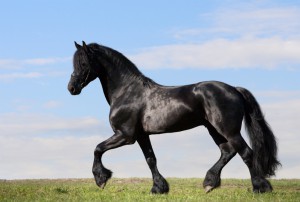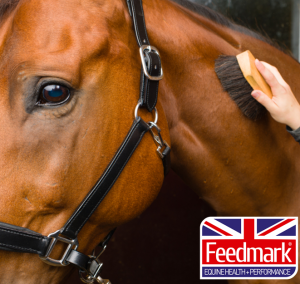 As horse owners we pride ourselves on the outer appeal of our horses, we reap comments about our horse’s fabulous coat and lustrous bloom. People are drawn to touch the sleek smooth supple coat and this give us a great sense of pride. The skin is the horse’s largest organ and its main function is to act as a protective barrier to the internal systems and can be susceptible to all sorts of challenges. If you have ever had the misfortune of becoming unwell or feeling run down you may have experienced your skin becoming dry and patchy, your hair greasy or lacking shine, maybe even your fingernails have become weak and fragile. Horses show similar signs when experiencing a lack of adequate nutrition, an illness which may have impacted on the horse’s immune system or possibly a reaction or allergy.
As horse owners we pride ourselves on the outer appeal of our horses, we reap comments about our horse’s fabulous coat and lustrous bloom. People are drawn to touch the sleek smooth supple coat and this give us a great sense of pride. The skin is the horse’s largest organ and its main function is to act as a protective barrier to the internal systems and can be susceptible to all sorts of challenges. If you have ever had the misfortune of becoming unwell or feeling run down you may have experienced your skin becoming dry and patchy, your hair greasy or lacking shine, maybe even your fingernails have become weak and fragile. Horses show similar signs when experiencing a lack of adequate nutrition, an illness which may have impacted on the horse’s immune system or possibly a reaction or allergy.  Common skin related problems in horses are a dull or scurfy coat, rubbing due to irritation and sweet itch. Winter brings a whole host of new problems for the skin, damp conditions can trigger mud fever and rain scald. As owners we feel embarrassed if our horse develops a skin challenge, why? Probably because we worry about what other people might think… like the healthy shiny coat, the scurfy coat or scabby leg will draw a crowd, subsequent comments and words of advice… its human nature I suppose. What can we do to help prevent skin challenges, well, how long is a piece of string. With shelves and shelves full of lotions, potions, feeds and supplements claiming to have the miracle cure for all skin challenges it is difficult to make an informed choice.
Common skin related problems in horses are a dull or scurfy coat, rubbing due to irritation and sweet itch. Winter brings a whole host of new problems for the skin, damp conditions can trigger mud fever and rain scald. As owners we feel embarrassed if our horse develops a skin challenge, why? Probably because we worry about what other people might think… like the healthy shiny coat, the scurfy coat or scabby leg will draw a crowd, subsequent comments and words of advice… its human nature I suppose. What can we do to help prevent skin challenges, well, how long is a piece of string. With shelves and shelves full of lotions, potions, feeds and supplements claiming to have the miracle cure for all skin challenges it is difficult to make an informed choice.  The best advice is to start at the beginning, look at the cause of the problem e.g. fly irritation, mud fever etc. try to reorganise your horse’s lifestyle to make them less prone to these environmental challenges. If you are struggling to find the root cause of the problems then seek advice from your vet. For on-going dull or poor coats, start with the basics, look at your horse’s nutritional intake and ensure that they are receiving a broad spectrum of vitamins and minerals as these are essential for your horse’s general health and wellbeing. For suspected allergy problems work with your vet to carry out an elimination diet to try and ascertain the cause. If your horse is prone to skin conditions then it may be a good idea to feed ingredients such as Omega 3, nettle, burdock root, chamomile and B vitamins which are successfully used throughout the equestrian world for their effects on the skin and coat. As horse owners we understand and share your problems so if you would like some friendly advice or just to chat through any worries or concerns regarding your horse’s health, nutrition or regime then please call us on 0800 585525, we’re open 7 days week or visit www.feedmark.eu. Feeding EquiDermis Plus can help to maintain healthy skin by providing omega-3 oils and specially selected herbs such as Nettle, Clivers, Chamomile and Burdock root to the diet. You will not only give your horse a wonderful bloom, but will help to support skin health naturally.
The best advice is to start at the beginning, look at the cause of the problem e.g. fly irritation, mud fever etc. try to reorganise your horse’s lifestyle to make them less prone to these environmental challenges. If you are struggling to find the root cause of the problems then seek advice from your vet. For on-going dull or poor coats, start with the basics, look at your horse’s nutritional intake and ensure that they are receiving a broad spectrum of vitamins and minerals as these are essential for your horse’s general health and wellbeing. For suspected allergy problems work with your vet to carry out an elimination diet to try and ascertain the cause. If your horse is prone to skin conditions then it may be a good idea to feed ingredients such as Omega 3, nettle, burdock root, chamomile and B vitamins which are successfully used throughout the equestrian world for their effects on the skin and coat. As horse owners we understand and share your problems so if you would like some friendly advice or just to chat through any worries or concerns regarding your horse’s health, nutrition or regime then please call us on 0800 585525, we’re open 7 days week or visit www.feedmark.eu. Feeding EquiDermis Plus can help to maintain healthy skin by providing omega-3 oils and specially selected herbs such as Nettle, Clivers, Chamomile and Burdock root to the diet. You will not only give your horse a wonderful bloom, but will help to support skin health naturally.
Les cookies nous permettent d'offrir nos services. En utilisant nos services, vous acceptez notre utilisation des cookies.











